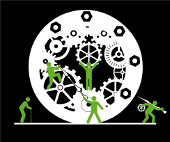The Danger of E-books
Richard Stallman
In an age where business dominates our governments and writes our laws, every technological advance offers business an opportunity to impose new restrictions on the public. Technologies that could have empowered us are used to chain us instead.
With printed books,
• You can buy one with cash, anonymously.
• Then you own it.
• You are not required to sign a license that restricts your use of it.
• The format is known, and no proprietary technology is needed to read the book.
• You can give, lend or sell the book to another.
• You can, physically, scan and copy the book, and it’s sometimes lawful under copyright.
• Nobody has the power to destroy your book.
Contrast that with Amazon ebooks (fairly typical):
• Amazon requires users to identify themselves to get an ebook.
• In some countries, Amazon says the user does not own the ebook.
• Amazon requires the user to accept a restrictive license on use of the ebook.
• The format is secret, and only proprietary user-restricting software can read it at all.
• An ersatz “lending” is allowed for some books, for a limited time, but only by specifying by name another user of the same system. No giving or selling.
• To copy the ebook is impossible due to Digital Restrictions Management in the player.
and prohibited by the license, which is more restrictive than copyright law.
• Amazon can remotely delete the ebook using a back door. It used this back door in 2009 to delete thousands of copies of George Orwell’s 1984.
Even one of these infringements makes ebooks a step backward from printed books. We must reject ebooks until they respect our freedom.
The ebook companies say denying our traditional freedoms is necessary to continue to pay authors. The current copyright system does a lousy job of that; it is much better suited to supporting those companies. We can support authors better in other ways that don’t require curtailing our freedom, and even legalize sharing. Two methods I’ve suggested are:
• To distribute tax funds to authors based on the cube root of each author’s popularity.
• (See http://stallman.org/articles/internet-sharing-license.en.html.)
• To design players so users can send authors anonymous voluntary payments.
Ebooks need not attack our freedom, but they will if companies get to decide. It’s up to us to stop them. The fight has already started.
Copyright 2011 Richard Stallman
Released under Creative Commons Attribution Noderivs 3.0.


